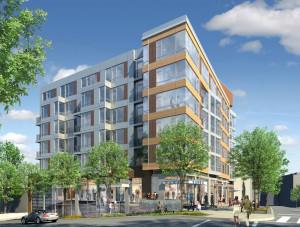It seems like a question with an obvious answer. City streets are owned by the city, which is to say the public, and access to them should be managed in the broad public interest. But as Aaron Wiener writes with regard to a project in Tenleytown in Northwest D.C., that’s not how it works in practice. Instead the streets are treated as the private property of people who live nearby. Thus, if you want to build an apartment building and sell or lease it to people but don’t want to build a parking garage and sell or lease the spaces to people, you need to pay the piper:
According to the soon-to-be-updated zoning code, Douglas is required to provide 87 off-street parking spaces it thinks its residents don’t need. And so it’s requested a so-called variance—nearly always granted these days if the local ANC approves—to exempt it from constructing any normal off-street spaces. (Douglas does still plan to provide a handicapped space and a space for a car-sharing program like Zipcar.) In order to secure ANC support for the no-parking proposal, Douglas has to offer the commissioners something in return, namely a generous community amenities package that persuades them that the development won’t lead to a surfeit of cars competing for street parking. After sometimes testy negotiations, Douglas and the ANC published a memorandum of understanding last night, outlining Douglas’ end of the deal.
In this case, it looks like the deal’s been sealed and the project will go forward. But as these kind of conflicts issue forth all across the country, there’s a strange conception of who the stakeholders are. Living where I do and not owning a car, I don’t care even a little bit if it gets harder to find street parking in Tenleytown. But I do care about the city’s tax base, the city’s unemployment rate, and the quantity of affordable housing in the city. So if I got to weigh-in on the dealmaking, I’d be coming down solidly on the side of build more stuff so more people can get jobs and houses and so the burden of financing local public services can be spread across a wider base. And presumably if Tenleytowners could come to my neighborhood and vote, they’d have a similar interest in promoting development and a lack of concern about our local parking situation.
But I can’t do that and neither can they. So in each case, the decision-making is biased toward less concern about jobs and housing and more concern about parking availability than it would be if the decision was made at a higher level. Which means that citywide we have too little working class employment and too little affordable housing. But there’s ample parking! And you can get a permit for just $35.00!
